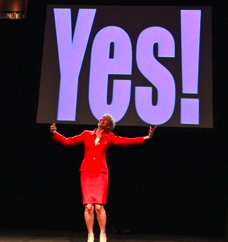Articles and News
HOW TO DEAL WITH THE CUSTOMER WHO IS ALWAYS RIGHT—EVEN WHEN THEY’RE NOT | February 02, 2012 (0 comments)

Scottsdale, AZ—Is it time to challenge the most sacred of retail cows, the belief that the customer is always right?
Yes, says Joy Baldridge, the renowned motivational speaker who addressed Centurion’s Tuesday morning retailer education session (left). The customer is always right—or, at least, they want to feel like they are. A successful retailer will make sure they always do feel they're right, even when they're clearly in the wrong.
To combat the urge to fight back, Baldridge says ask questions. The more you know about what the customer really wants, the more power you have. “Those who ask the questions have all the power,” she emphasized. Her universal solution to any customer dilemma can be summed up in one word: really.
As in, “Really? Tell me more.”
Customer just came in with a sheet from Blue Nile and a lesson in the Four C’s? Embrace the moment. “Really? Tell me more. Tell me what Blue Nile said.
“Bear in mind the customer may have been on Blue Nile but he’s now in your store—so something kept him from just buying the diamond outright,” she said. That’s your cue to probe and see why he didn’t just buy it online, answer his needs or doubts, and turn a confrontation into an opportunity.
Asking questions also is the best way to diffuse a tense situation with a customer. When a client has an issue, ask what you can do to make it better. Don’t throw ideas at them, ask what it is they want, she said. They may say something you don’t want to hear, but whether they say it or not they’re still upset.
Baldridge emphasized what she calls the “platinum rule.” While the golden rule says treat people the way you want to be treated, the platinum rule says treat customers the way they want to be treated. Listen to what they’re saying and use their own words to persuade them.
Those who prepare the most win, she said. If you’re in a negative frame of mind, get into a positive place before you start work. “People don’t go into a cave alone. Misery loves miserable company and they descend into a cave where they can commiserate,” she said.
We have built-in stress reducers, she said. First, don’t negate the importance of proper nutrition, exercise, and rest, but the best stress modifier we all have—and it’s greatly underutilized—is breathing.
When you’re in a bad mood or angry at an employee, family member, or customer, use the 4-4-6 breathing exercise: inhale for four seconds, hold for four seconds, exhale for six seconds, and repeat as necessary. It is a proven strategy that does work, she said.
Baldridge’s five tips for success:
1) Be flexible and adaptable. That which is rigid breaks, that which is flexible doesn’t.

Despite this ominous situation, Baldridge made it to her Centurion presentation with all her limbs still attached.
2. Question and actively listen. “What’s most important to you?” She offered the example of house hunting, where the first realtor she worked with tried to sell every house on the basis of a fabulous kitchen and many bathrooms—traits most buyers want. But Baldridge doesn’t cook (her husband does) and she doesn’t care what the kitchen looks like, nor does she feel the need to have 1.5 bathrooms per person. But she insists on a fabulous backyard. The second realtor Baldridge worked with asked a lot of questions about how she lives her life day to day, and figured out her love of a good backyard. She began each house tour not in the front foyer but in the backyard.
“Really? Tell me more,” she emphasized. Three ways to resist the urge to talk so that you listen more actively:
- Bite your tongue. Literally. Just do it unobtrusively.
- Drink heavily. As in, have a glass or bottle of water in hand, ask the customer what’s most important to him or her, then take a sip. Keep sipping till they finish speaking.
- Jot a thought. Write what the customer is saying in words they are using. Remember, nothing persuades someone more than their own words.
3. Givers gain. Something that might be of little cost to you might be of high value to the customer.
4. Be a solution seeker and look for the variables. Everyone knows the old saying that you can lead a horse to water but you can’t make it drink. Maybe not, said Baldridge, but her father taught her the solution: salt the hay.
5. Your goodbye is as important as your hello. Make sure the customer feels appreciated and welcomed to come back, even if they didn’t make a purchase.







